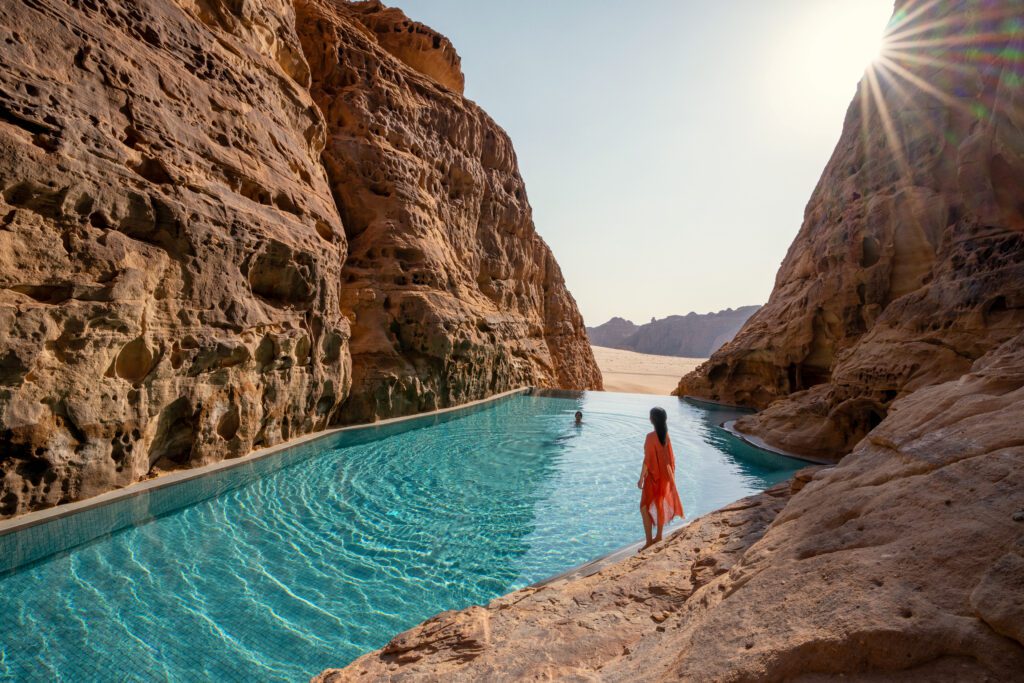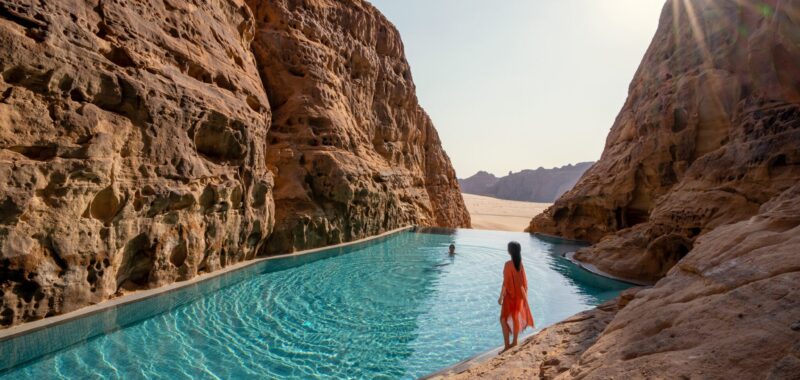
This sponsored content was created in collaboration with a Skift partner.
With climate change becoming more top of mind for travelers, the demand for sustainable travel destinations has never been stronger. According to a recent report by Euromonitor International, almost 80 percent of travelers are open to spending up to 10 percent more on sustainable travel options. The Vacationerâs 2023 sustainable travel survey found that 74 percent of people intend to make greener travel decisions.
Destinations around the world are responding to this rising call for environmental protection by integrating sustainability into their tourism strategies. For example, AlUla, Saudi Arabiaâs newest heritage destination, has developed a âlight-touch tourismâ model to achieve sustainable growth from the outset. This strategy minimizes environmental impact while maximizing cultural preservation and traveler experience. It focuses on attracting people interested in authentic experiences rather than maximizing visitor numbers.
âLight-touch tourism may be a global trend, but AlUlaâs approach is more than just a bid to draw visitors â it focuses on offering a quality experience while preserving the regionâs natural and cultural heritage. Weâve developed a low-impact tourism model that aligns with AlUlaâs environment, seasons, and values. Long term, itâs about the quality of the experience and its impact on the community, not about mass tourism,â said Phillip Jones, chief tourism officer at the Royal Commission for AlUla (RCU).
AlUlaâs Introduction to the World
Located in Saudi Arabiaâs northwest region on the original pilgrimage route to Makkah, AlUla is home to striking sandstone canyons, ancient rock formations, volcanic plains, valleys, and oases dotted with over 2.3 million palm trees. The region has witnessed over 200,000 years of human history, with 7,000 years of successive civilizations. Despite this ancient heritage, the region remained largely inaccessible until it opened its door to tourism five years ago when Saudi Arabia started issuing tourist visas for non-religious travel.
The Kingdom introduced AlUla on the world stage earlier this year with the launch of its first global brand campaign, âForever Revitalising.â Taking a differentiated approach to communications, the campaign breaks away from the typical âhereâs what you can do in our destinationâ travel pitch. Instead, it highlights the regionâs natural landscapes and showcases local interactions with themes of renewal and transformation to reflect its vision of becoming eternally relevant.
âThe âForever Revitalisingâ campaign is fundamentally about presenting AlUla’s narrative to the world for the first time, but it also showcases our dedication to sustainability, cultural and historic preservation, and community engagement. It represents a commitment to developing and promoting AlUla as a destination that continuously evolves and revitalizes itself,â said Melanie de Souza, executive director of destination marketing at RCU.
Launched last February in major cities like Dubai, London, New York, Paris, Shanghai, and Mumbai, the campaign spans nine key markets in six languages.
A Look at AlUla Today
Those who visit AlUla today can expect to experience unique oasis-to-table dining that features locally grown produce, eco-friendly activities that have minimal impact on the environment, and accommodations that adhere to sustainable principles.
These include luxury properties such as the Banyan Tree and Habitas in Ashar Valley, which provide low-rise, environmentally conscious lodging options amidst sandstone mountains. Banyan Tree offers luxury tented accommodations with private pools, while Habitas focuses on community and shared experiences. The newly opened Dar Tantora hotel in the Old Town blends with the 900-year-old mudbrick village where it resides, and the upcoming Chedi hotel will be the first accommodation ever to be set within a UNESCO classified heritage site.
AlUlaâs key landmarks include the Nabataean Kingdom of Hegra, Saudi Arabiaâs first UNESCO World Heritage Site, which features over a hundred towering tombs carved into hillsides that light up with a burnished gold hue at sunset. Other significant sites include the AlUla Old Town, recognized by the United Nations World Tourism Organization (UNWTO) as one of the worldâs best tourism villages, and Jabal Ikmah, the countryâs largest concentration of stone inscriptions, which has also been inducted into UNESCOâs Memory of the World Register.
âWe take pride in being the most advanced of Saudiâs giga-projects with a strong calendar of heritage sports, arts, and cultural events, and a plethora of experiences already available for booking. Stunning landscapes provide the perfect backdrop for wellness, adventure, and outdoor activities, such as trail hiking, clear skies for stargazing, and early morning ballooning that lets you waft over the clouds above Hegra,â said Jones.
Eco-Tourism and Sustainability Initiatives
AlUlaâs commitment to nature is structured around its Sustainability Charter that guides all its planning and development efforts, with specific objectives, policies, and decisions accompanying its core principles.
RCU has introduced two master plans based on these principles. The first of which, called âJourney Through Time,â focuses on revitalizing the regionâs archaeological sites and involves extensive digs that uncover and preserve the stories of ancient civilizations that have called AlUla home over the millennia. It envisions AlUla as a âliving museumâ with an eco-conscious, carbon-neutral approach.
âAlUlaâs plans not only align with Saudi Arabiaâs Vision 2030 objectives, but we have built-in key measures of success to include jobs generated and delivery against our Sustainability Charter,â said Jones.
The second master plan is titled âTowards a Prosperous Society.â It targets urban growth in central and southern AlUla, emphasizing equitable expansion that benefits residents and tourists by integrating nature, history, and urban lifestyle features. It aims to create green spaces and architectural designs that resonate with AlUlaâs historical context.
Some of the Charterâs objectives include achieving carbon neutrality by 2035, planting 10 million trees, reintroducing over 1,580 animals from four species into the region, implementing an annual cap of two million visitors by 2035, establishing a 31-mile (50 kilometers) autonomous electric pod service to connect AlUla Old Town to the southern car park, and executing a 13.9 mile (22.4 kilometers) Phase One of the AlUla Experiential Tramway, which will connect its five core districts.
âWe follow strict environmental guidelines to ensure that growth does not come at the expense of the regionâs natural heritage. Over 50 percent of AlUla is now classified as a nature reserve, and efforts are underway to regenerate land that has suffered from desertification and overgrazing over the years. We have a wealth of experts working to restore the ecological balance and reintroduce native flora and fauna. Weâre also conducting efforts within our Sharaan Nature Reserve, to conserve the Arabian leopard, which remains on the endangered list with only 200 left in the world,â said Jones.
As AlUla develops as a destination, it aims to do so in a manner that benefits its residents. The regionâs goals include creating 38,000 new jobs, contributing $32 billion (SAR 120 billion) to the Kingdom’s GDP, and increasing its population to 130,000 by 2035.
âCommunity is at the heart of everything we do. We aim to upskill the 46,000 people who call AlUla home and create pathways for their economic prosperity. We’re working to provide scholarships and training to locals and revive the ancient arts and craftsmanship of yesteryears,â said Jones.
Saudi Arabia aims to increase tourismâs contribution to its GDP from 3 percent to 10 percent by 2030. According to Jones, the projected SAR 120 billion boost through job creation and cultural promotion demonstrates AlUlaâs significant economic impact.
âThe journey ahead for AlUla is one of pioneering sustainable tourism while honoring its rich past. We believe that AlUla deserves recognition alongside other great heritage destinations like Egypt, Turkey, and Jordan, where history and heritage continue to drive travel,â Jones said.
For more information about AlUla, click here.
This content was created collaboratively by AlUla and Skiftâs branded content studio, SkiftX.

